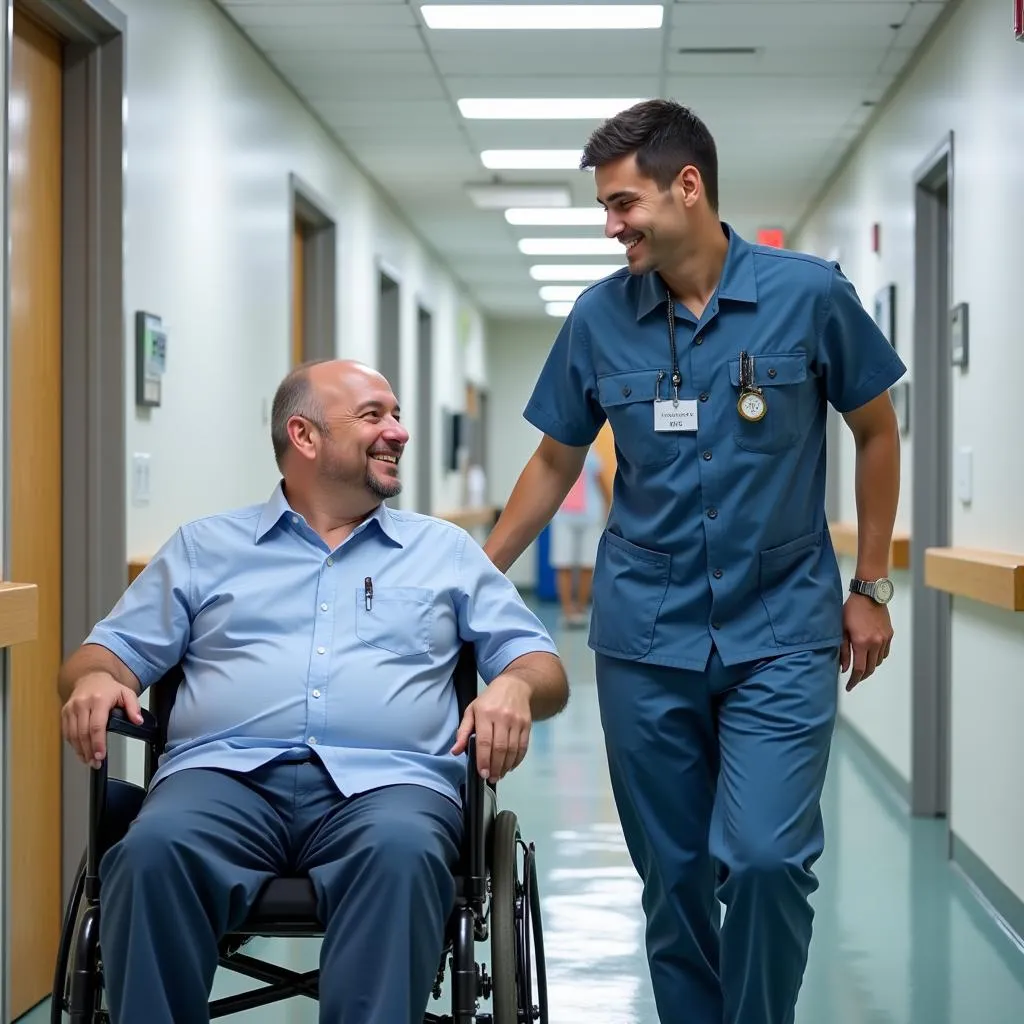Hospital porters are often unseen, yet their contributions to the smooth running of a hospital are invaluable. They are the backbone of the healthcare system, ensuring patients, equipment, and vital supplies are where they need to be, when they need to be there. But what exactly do these dedicated individuals do? Let’s take a closer look at the multifaceted world of Hospital Porter Duties.
The Diverse Responsibilities of a Hospital Porter
Hospital porter responsibilities extend far beyond simply pushing patients in wheelchairs. Their tasks are varied, demanding a unique blend of physical strength, organizational skills, and a compassionate heart. A typical day might involve:
- Patient Transportation: This includes escorting patients to and from wards, operating theatres, and various departments using wheelchairs, beds, or stretchers. They also assist patients with mobility issues, ensuring their comfort and safety during transfers.
- Transferring Confidential Documents and Valuables: Porters often handle sensitive patient information and belongings. This requires discretion, responsibility, and adherence to strict confidentiality protocols.
- Moving Equipment and Supplies: From heavy medical equipment to essential supplies, porters ensure the seamless flow of resources throughout the hospital. This involves careful handling, knowledge of storage areas, and timely delivery.
- Maintaining a Clean and Safe Environment: Hospital porters play a crucial role in infection control and patient safety. They are responsible for transporting clinical waste, cleaning spills, and maintaining the overall cleanliness of their designated areas.
- Assisting with Emergency Situations: During emergencies, porters are often the first responders. They may assist with patient evacuations, transport critical equipment, or provide any other support required by medical staff.
 Hospital porter carefully pushes a patient in a wheelchair down a hospital corridor
Hospital porter carefully pushes a patient in a wheelchair down a hospital corridor
The Importance of Excellent Communication and Interpersonal Skills
While physical strength is important, hospital porters also need exceptional communication and interpersonal skills. They interact with a diverse range of individuals, including patients from all walks of life, anxious family members, and busy medical professionals.
- Effective Communication: Porters need to communicate clearly and respectfully with patients, often explaining procedures or providing directions. They also need to understand and respond appropriately to patient needs, especially those who are disoriented or distressed.
- Empathy and Compassion: Many patients interacting with porters may be in pain, scared, or feeling vulnerable. A caring and compassionate approach can make a significant difference to their hospital experience.
- Teamwork: Porters work closely with nurses, doctors, and other hospital staff, playing a vital role in the overall patient care team. Their ability to collaborate effectively and follow instructions is crucial for seamless hospital operations.
 Hospital porter leans down to speak with an elderly patient in a hospital bed
Hospital porter leans down to speak with an elderly patient in a hospital bed
Going Beyond the Call of Duty: The Unsung Heroes
Hospital porters often go above and beyond their defined roles. They might spend extra time comforting a distressed patient, offer a listening ear to a worried family member, or simply brighten someone’s day with a friendly smile. These small acts of kindness, while often unnoticed, contribute significantly to the positive and supportive environment of a hospital.
“As a hospital porter, you witness a wide spectrum of human emotions daily,” says John Smith, Senior Porter at City General Hospital. “Yes, we have our tasks, but sometimes, just offering a reassuring presence or a few kind words can make all the difference to someone going through a difficult time.”
A Rewarding Career Path: Making a Difference Every Day
The role of a hospital porter is both challenging and rewarding. It offers the opportunity to make a tangible difference in people’s lives, contributing to their well-being during their most vulnerable moments. If you are seeking a career path that combines physical activity with meaningful human interaction, becoming a hospital porter might be the perfect fit.
Hospital porter responsibilities are diverse and demanding, requiring a unique blend of physical stamina, strong communication skills, and a compassionate heart. They are the unsung heroes of healthcare, working tirelessly behind the scenes to ensure the smooth running of hospitals and the well-being of patients.